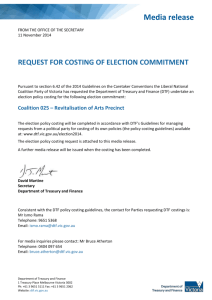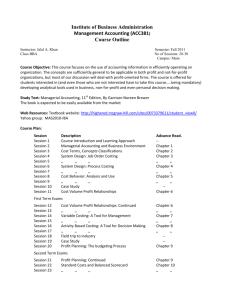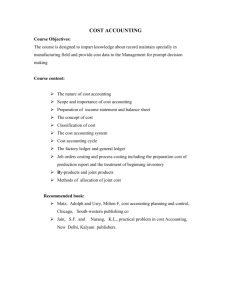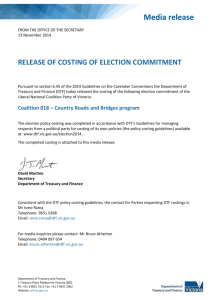Appendix A: Standard policy costing conventions
advertisement
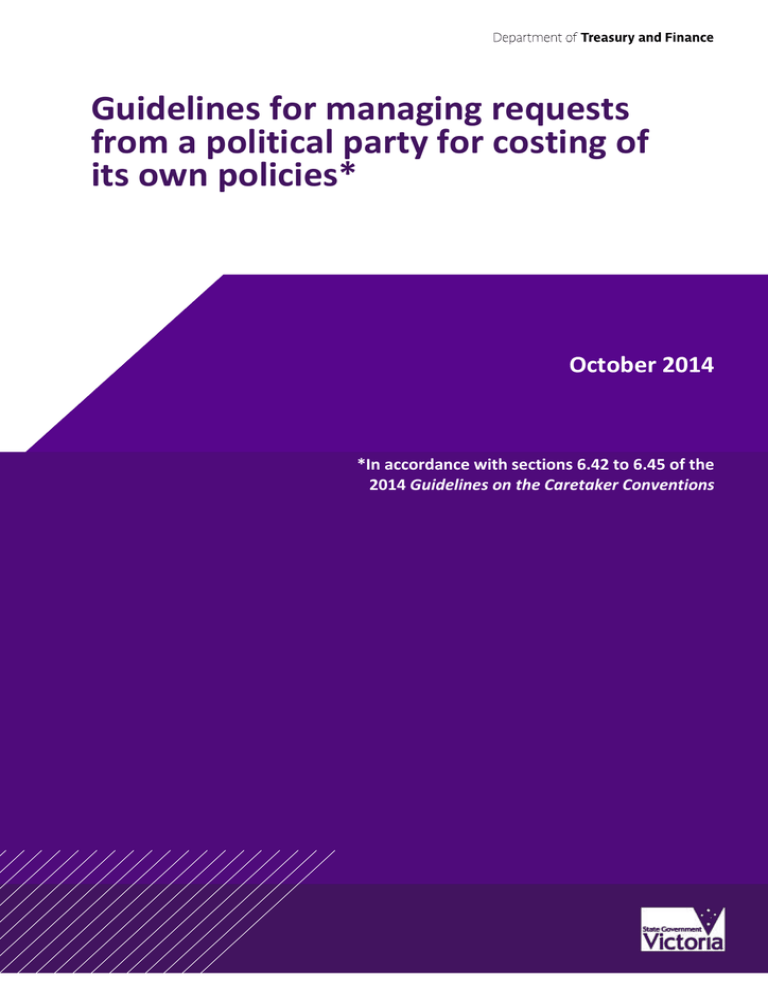
Guidelines for managing requests from a political party for costing of its own policies* October 2014 [DRAFT] *In accordance with sections 6.42 to 6.45 of the 2014 Guidelines on the Caretaker Conventions The Secretary Department of Treasury and Finance 1 Treasury Place Melbourne Victoria 3002 Australia Telephone: +61 3 9651 5111 Facsimile: +61 3 9651 2062 dtf.vic.gov.au Authorised by the Victorian Government 1 Treasury Place, Melbourne, 3002 © State of Victoria 2014 This work is licensed under a Creative Commons Attribution 3.0 Australia licence. You are free to reuse the work under that licence, on the condition that you credit the State of Victoria as author. The licence does not apply to any images, photographs or branding, including the Victorian Coat of Arms, the Victorian Government logo and the Department of Treasury and Finance logo. Copyright queries may be directed to IPpolicy@dtf.vic.gov.au ISBN 978-1-922222-31-2 Published October 2014 If you would like to receive this publication in an accessible format please email information@dtf.vic.gov.au This document is also available in Word and PDF format at dtf.vic.gov.au The Department of Treasury and Finance acknowledges the contribution of the Commonwealth Departments of The Treasury and Finance and Deregulation in the development of these policy costing guidelines through their provision of the Charter of Budget Honesty, Costing Election Commitments. Policy Costing Guidelines, October 2014 1 Contents Foreword............................................................................................................ 1 Part 1: Summary; including context, timing, process and outcome .................... 2 Part 2: Aims, methodology and assumptions ..................................................... 4 Part 3: Request process, detail and time required and security ......................... 6 Part 4: Constraints and public release ................................................................ 7 Appendix A: Standard policy costing conventions .............................................. 8 Appendix B: Sample request .............................................................................. 9 Appendix C: Sample release ............................................................................. 10 Appendix D: Flow chart .................................................................................... 12 Policy Costing Guidelines, October 2014 2 Foreword The Guidelines on the Caretaker Conventions (‘the caretaker conventions’), issued by the Department of Premier and Cabinet in 2014, outline circumstances whereby the Department of Treasury and Finance may be called upon to cost policies at the request of a political party. The caretaker conventions are available in full at www.dpc.vic.gov.au . The ‘Policy Costings’ sections, 6.42 to 6.45, are outlined below: 6.42 Requests for policy costings may be made by Government and non-Government parties to DTF. A party may only request costings of its own published policies. 6.43 DTF will cost the Government and non-Government Party policies in conjunction with relevant Departments. 6.44 The costings will be undertaken, provided any assumptions necessary for the costings are identified for the Departments or do not require Departments to undertake extensive policy research. 6.45 After a policy has been costed, DTF will: advise the relevant party of the costing; and publish the costing, and material assumptions used in its preparation, on its website. The information will therefore be publicly available. In preparing itself to manage any such requests the Department of Treasury and Finance has developed this document; Guidelines for managing requests from a political party for costing of its own policies (‘the policy costing guidelines’) based on similar guidelines developed in 2010. The Pre-Election Budget Update, to be released within 10 days of the issuing of the writ for the 2014 Victorian election, will be the primary point of reference for costing policies including relevant economic parameters. The policy costing guidelines are intended to inform those requesting policy costing of the general methodology that is to be applied, what information will need to be supplied when requesting a policy costing and what will be produced. Signed David Martine Secretary Department of Treasury and Finance Policy Costing Guidelines, October 2014 1 Part 1: Summary; including context, timing, process and outcome The following list outlines key elements of the process: 1. The caretaker conventions issued by the Department of Premier and Cabinet (DPC) remain the authoritative guide regarding the role and responsibilities of the Victorian Public Sector during the caretaker period1. As outlined in the foreword the policy costing guidelines explain in further detail a discrete section of the caretaker conventions. 2. During the caretaker period, the Department of Treasury and Finance (DTF) may be asked by a political party to cost its own policies. 3. A request by a political party to cost its own policies must: be made no earlier than 6pm on 4 November 2014 (the start of the caretaker period); be made in writing to DTF; fully outline the policy to be costed, giving relevant details including stating assumptions sufficiently to enable costings; state the purpose or intention of the policy; and nominate a contact person and include that person’s contact details. 4. The relevant DTF contact will be Mr Ismo Rama, Assistant Director, Economic Policy Group2, who will acknowledge receipt via email to the person nominated by the party in the request and list the request on the DTF website at www.dtf.vic.gov.au/election2014 at the next available opportunity. 5. DTF will endeavour to complete costings and communicate its completion to the nominated party contact within 5 business days of receiving a costing request. 6. After a policy has been costed, DTF will advise the nominated party contact by email of the outcome of the costing and that it intends to publish the outcome on the DTF website as soon as is practicable. 7. DTF will advise the nominated party contact at least four business hours in advance of the publication of any costings. Note that where a policy request is received after 5pm Wednesday 26 November, DTF may not be able to provide four business hours notice to the Party contact prior to public release. 8. Where required, DTF may seek assistance in costing policies from other departments or agencies. 9. If necessary, in order to fully cost a policy, DTF may request more information from the requesting party, through the nominated party contact. 1 In 2014 the caretaker period is expected to commence on 6pm on Tuesday 4 November and continue until the result of the election is clear, or, if there is a change of Government, until the new Government is appointed. 2 ismo.rama@dtf.vic.gov.au Policy Costing Guidelines, October 2014 2 10. Policy costing requests should be made no later than 5.00 pm on Thursday 20 November 2014 to allow five working days for the costing to be completed and allow public release of the costing on the Thursday prior to polling day. 11. DTF will advise the nominated party contact in all circumstances where a costing was not able to be completed. The reason for not completing the costing (e.g. time constraints or insufficient information) will also be published on the DTF website, along with the originally submitted request. Policy Costing Guidelines, October 2014 3 Part 2: Aims, methodology and assumptions Aims DTF aims to be as clear, transparent and timely in costing policies as possible and will therefore: provide its best estimate of the full cost of a policy; complete the costing in the shortest time possible, generally within five working days; cost policies in a manner consistent with methodologies used to prepare the annual Budget statements, the Pre-Election Budget Update (PEBU) and other financial reports; cost all policies across all parties in a consistent manner; only provide fiscal costings, and not provide policy advice or assessments of the economic impact of policies; and produce a self-contained written report on the costing that explains the published costings, and material assumptions used in arriving at the conclusions.3 Methodology The costings will be produced in a manner consistent with normal costing practice. A list of standard policy costing conventions is provided in Appendix A. Policy costings will estimate the financial impacts of the proposal concerned. The focus of costings will be on initial (first round) effects and the direct budgetary consequences of policies. Policy costings will, generally, not account for the impact on State debt interest payments, unless: it is an explicit policy objective to affect the level of interest payments; or the policy involves a financing type transaction where the major Budget impact is through State debt interest payments. In the case of costing a policy package (comprising a related set of initiatives, possibly across several portfolios), both the cost of individual components and the overall cost of the package will be undertaken. Where a party submits a final aggregated package of all its election commitments and funding sources to DTF for costing, DTF will comment on the net financial impact of the overall policy package on the operating surplus and net debt. Assumptions In relation to the assumptions to be used, the caretaker conventions state that the ‘…costings will be undertaken, provided any assumptions necessary for the costings are identified for the Departments or do not require Departments to undertake extensive policy research.’ Any economic data or forecasts used in costing policies will be consistent with the most recent publicly released estimates as contained in the PEBU4. 3 This report, as well as the original request and any other material provided by the contact person, satisfies DTF’s obligations under section 6.45 of the caretaker conventions. Policy Costing Guidelines, October 2014 4 The nature of any assumptions used will be made clear by DTF when releasing costings and any caveats associated with the assumptions will be outlined. Assumptions regarding behavioural responses of the people affected by policies will be taken into account where it is normal practice to do so. Where there are significant behavioural effects, the assumptions used in the costing will be clearly identified in the publicly released costing report. Moreover, while costings will generally be the best assessment of the cost of a policy, in cases where assumptions are particularly uncertain, costings may be provided as a range of possible outcomes. 4 Pursuant to section 27C of the Financial Management Act (1994) the Secretary of the Department of Treasury and Finance is required to release the Pre-Election Budget Update (PEBU), within 10 days after the issue of the writ for the 2014 Victorian election. Policy Costing Guidelines, October 2014 5 Part 3: Request process, detail and time required and security Request process Requests for policy costings should be made to DTF via email to ismo.rama@dtf.vic.gov.au Detail The provision of full information at the time of submitting the request to cost the policy will help to minimise unnecessary delays. Appendix B provides an example of the type of information normally required for a timely policy costing to be prepared. A request should fully outline the design features of the policy, including the intention of the policy. It will assist in the preparation of costings if detailed information is provided on the assumptions that parties may have used in making their own costing assessments. However, DTF will still endeavour to undertake a costing even where the party has not provided its own costing assessments. It should be noted that material assumptions used by DTF in the costing will be made clear at the time of release of the costing. Where there is an inconsistency between the stated intention of the policy and its design features, the policy will be costed on the basis of its design features. Time required DTF will endeavour to complete a costing within five working days of having received a request. However, this may not be possible in the case of complex costing requests or where data is difficult to obtain. If DTF considers that further information is required, it will request it in writing from the nominated party contact. DTF will endeavour to ask for any additional information it requires within two working days of it receiving the policy costing request. The further information should be forwarded to DTF in writing. Where additional information is required, the five working days will exclude the time taken to obtain the additional information. DTF will release completed costings up to 5pm Thursday 27 November 2014. DTF will not release costings after this time. See Attachment D for a summary of process timing. Security Security and confidentiality arrangements will be consistent with those applied to budget preparation. DTF will disclose that it has received a policy costing request and its current status on the DTF website. The nominated party contact will be advised of the outcome of the costing at least four business hours prior to it being published on the DTF website. Note that where a policy request is received after 5pm Wednesday 26 November, DTF may not be able to provide four business hours notice to the Party contact prior to public release. Policy Costing Guidelines, October 2014 6 Part 4: Constraints and public release Constraints The policy costing guidelines require that policy costings be provided to the nominated party contact as soon as is practicable after a costing request has been made. Where a policy costing is not possible, DTF will advise the nominated party contact to that effect. If a policy costing request is received after 5pm Wednesday 26 November DTF will endeavour to provide a costing. Priority will be given to costing earlier requests. The non-release of a policy costing may be due to: time constraints that prevent the policy being costed by 5pm Thursday 27 November 2014 ; the provision of insufficient information about the policy to allow DTF to properly cost it; or there being insufficient data available to reliably cost the policy. Public release The Department’s arrangements for public release of a policy costing will be: 1. The nominated Party contact will be advised of the outcome of the costing at least four business hours prior to the publication of the costing of the DTF website. Note that where a policy request is received after 5pm Wednesday 26 November, DTF may not be able to provide four business hours notice to the Party contact prior to public release. 2. The costing will be published on the DTF website www.dtf.vic.gov.au/election2014 . 3. The costing methodology and the material assumptions used in costing the policy will be disclosed. Costings will not include policy advice or assessments of the economic impact of policies but will include: an outline of the specific costing methodology and assumptions used (including economic and any behavioural assumptions) in sufficient detail to allow an understanding of how the costing was determined; and a table setting out the financial impact against the current financial year and forward estimates period (the following three financial years) or in terms of total estimated investment (TEI). A sample of the form in which a policy costing will be publicly released is provided in Appendix C. Policy Costing Guidelines, October 2014 7 Appendix A: Standard policy costing conventions The following are standard conventions for the preparation of policy costings. Costings are produced in a manner that is consistent with normal costing practice and are based on any effect on the State's financial statements. Costings are provided on an annual basis for the Budget and Forward Estimates period, or in the case of an asset investment, in terms of total estimated investment. For the 2014 election the Budget and Forward Estimates period is 2014-15 to 2017-18. Full-year, part-year and one-off effects are distinguished. Costings are generally to the best point estimates, however, costing ranges are provided if they are considered appropriate. Assumptions are reviewed for reasonableness in terms of cost, potential demand and implementation period. Policy Costing Guidelines, October 2014 8 Appendix B: Sample request Type of information normally expected to be included by a political party in a request for costing an election policy Name of policy: Party requesting costing (and nominated party contact/s details): Date of public release of policy (including source of party statement/media release): Summary of policy: Intention of policy: Description of policy: List of key assumptions Scope of initiative Intended date of implementation and end date where relevant. Financial impact of the policy where available (cost impacts by year and/or total estimated investment (TEI) for asset initiatives). Specification of any assets and any associated outputs required? Who is expected to be affected by the policy? Are any behavioural responses expected? If so, what are they? Policy Costing Guidelines, October 2014 9 Appendix C: Sample release Type of information to normally be included in the public release of an election policy costing Party making the request: Name of policy: Description of policy: Date of public release of policy: Date of receipt of request: Additional information requested (including date): Additional information received (including date): Costing methodology used: scope of initiative; costing techniques; policy parameters; statistical data used; and behavioural assumptions used (as appropriate). The cost of the proposed output initiative for the forward estimates period is set out below: 2014-15 2015-16 2016-17 2017-18 Four year total (2014-15 to 201718) DTF costing of output initiative Note - where a four year costing estimate that includes 2018-19 is requested, DTF will provide a costing figure for 2018-19 where possible. Where a 2018-19 costing is possible, the table above will remain unchanged and the costing will be addressed using the following text: The [xxxx Party] has included an estimate for 2018-19 of $xm. DTF has undertaken a costing of this figure and considers $ym to be a reasonable estimate for 2018-19 and notes that this would bring the total estimated cost of the proposal to $ z million over five years. Policy Costing Guidelines, October 2014 10 Where a 2018-19 costing is not possible, the following text will be included: The [xxxx Party] has Included an estimate for 2018-19 of $xm, however, it has not been possible to undertake a costing of this estimate. When costing an asset initiative the outcome will be shown as follows: TEI DTF costing of asset inititiative Where a party submits a final aggregated package of all election commitments and funding sources to DTF for costing, DTF will comment on the net financial impact of the overall policy package on the operating surplus and net debt. Where DTF completes a costing of a policy package, any surplus and debt impacts may be addressed using the following table: 2014-15 2015-16 2016-17 2017-18 Aggregate increase/decrease in net result from transactions for the general government sector Aggregate increase/decrease in net debt for the general government sector DTF comments section Where relevant, includes separate identification of revenue, expense, asset and liability components. Where appropriate, includes range for the costing or sensitivity analysis. Caveats or qualifications to the costing. Associated material: Copy of request as received by DTF and any additional information requested by DTF from party. Policy Costing Guidelines, October 2014 11 Appendix D: Flow chart DTF receives request from Political Party. Note: The Party need not communicate further with DTF (i.e. pursuant to section 6.42 of the caretaker conventions) after lodging the initial request. DTF sends email acknowledgement of receipt of request to Party nominee and lists on website. DTF receives request prior to 5:00pm Thursday, 20 November 2014. DTF receives request between 5:00pm Thursday, 20 November 2014 and 5:00pm Wednesday, 26 November 2014. DTF receives request after 5:00pm Wednesday 26 November 2014. DTF endeavours to undertake the costing within five business days of it receiving the request and to publicly release the costing by 5:00pm Thursday, 27 November 2014. DTF will employ its best efforts to complete the costing and release it publicly by 5:00pm, Thursday 27 November 2014. Listed on website. The five business days excludes any timing delays associated with awaiting necessary additional information from the Party. DTF’s capacity to complete a costing may be impacted by the number of requests received. Priority will be given to requests received prior to 5:00pm Thursday, 20 November 2014. DTF contacts Party contact by email to advise the outcome of the costing and that it will be publicly released at least four business hours thereafter. DTF’s next obligation (i.e. pursuant to section 6.45 of the caretaker conventions) is to publish the costing outcome on its website: www.dtf.vic.gov.au/election2014 Policy Costing Guidelines, October 2014 DTF will endeavour to complete and publish the costing. In addition priority will be given to earlier requests. DTF may not be able to provide four business hours notice to the Party contact prior to public release. 12 www.dtf.vic.gov.au Policy Costing Guidelines, August 2014 13
